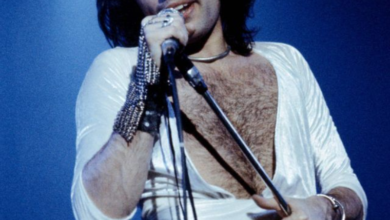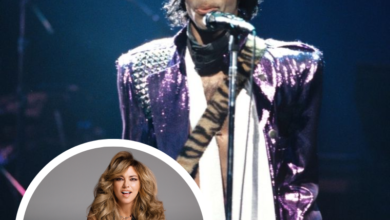15 Prince-Penned Songs You Didn’t Know Were Hits for Other Artists
OPINION: This article may contain commentary which reflects the author's opinion.
Minneapolis’ favorite son was a whirlwind of creativity that knew no bounds, the purple-minded genius releasing dozens of albums on his own, but also mentoring and producing dozens of bands like dirty-minded girl group Vanity 6 and synth-funk dynamos the Time. His songs became massive pop hits for stars as disparate as Sinead O’Connor, Chaka Khan, the Bangles and Tevin Campbell. He turned his personal treatises on sexual persona, spiritual angst and social unrest into a universal art that spoke to millions, no matter their race, class, or gender. Few pop artists over the past four decades were as universally beloved as Prince. These are some of the best Prince songs that became hits for others.
Four years before Janet Jackson converted “nasty” from a pejorative into a positive, Vanity 6 got the wheels greased with “Nasty Girl.” The 1982 single was the first (and only) hit by the Prince-assembled girl group. He also wrote and produced the track, whose sleazy pleasures were tailor-made for the dance floor (as well as the stripper pole). “At first, Prince wanted to call me Vagina,” said Vanity, who was born Denise Matthews, in an interview with Bam in 1985. “Even though he pronounced it Va-jeana, that would have been too weird. His next choice was Vanity. I liked that.” The song reached the top spot in Billboard‘s Hot Dance Club Play chart, only to be knocked off, ironically enough, by Prince’s “1999.”
Technically, the raspy 1983 Wild Heart dance track “Stand Back,” was written by Nicks herself – but Nicks has said it “belongs” to Prince. She likes to tell its origin story: It was the day of her wedding, she and her new husband Kim Anderson were driving North to Santa Barbara for their honeymoon when she heard “Little Red Corvette” for the first time. She wrote “Stand Back” start to finish that day, humming along to the Prince single. When she later went to record the song, she called to tell him the story. Twenty minutes later the Purple One showed up at her studio. He “walked over to the synthesizers that were set up, was absolutely brilliant for about 25 minutes and then left,” she later told Timothy White. “He spoiled me for every band I’ve ever had because nobody can exactly recreate – not even with two piano players – what Prince did all by his little self.”
Before splitting off to become one of the top songwriting/producing teams in the business, Jimmy Jam and Terry Lewis were members of the Time, the Prince-assembled group whose first hit came in 1984 with “Jungle Love.” It’s not hard to see why it made a splash; the song’s hard funk groove, Tarzan-esque motif and hooky refrain carried all the formidable dance-floor oomph of a Prince song. Prince is credited as co-writer and producer of the track, although the Time’s guitarist Jesse Johnson soon disputed his former boss’ role in its creation – in less than diplomatic terms. “Prince is such an asshole,” Johnson told the NME in 1986. “I wrote, played and produced stuff like ‘Jungle Love,’ that’s my sound.”
This funk-laced track about a woman who, despite having the outward trappings of “happiness,” wants romantic love became the pop breakthrough for Sheila Escovedo, who met Prince in 1978. (“Oh, I know who you are,” he said to her after she introduced herself.) The coda, which showcases Sheila E.’s incredible prowess on the drums and a wild sax solo by jazzman Jarry Williams, was snipped from the radio edit, but became well-known because of its delirious virtuosity. “‘The Glamorous Life’ was the last song we worked on. In fact, we weren’t even going to include it on the album,” Sheila E. wrote in her 2014 memoir, The Beat Of My Own Drum. “It started out as an instrumental, and I couldn’t think of any lyrics for it at first. Once I got started, though, the words came quickly … It was very percussive and it had a catchy melody, incorporating all the black keys on the piano so that it almost sounded like a nursery rhyme.”
Prince allegedly penned “I Feel for You” as a valentine to one of his crushes, jazz-funk queen Patrice Rushen, and included it on his 1979 self-titled album. Years later, Chaka Khan and longtime producer Arif Mardin turned “I Feel for You” into a Gold-certified cataclysm of electro-funk, R&B and hip-hop. There is the seductive voice of Melle Mel of “The Message” and Beat Street fame serenading Chaka, a harmonica riff from Stevie Wonder and those loud, blaring synthesizer stabs typical of pop music of the era. Just as big was its heavy-rotation video clip that featured L.A. break dancers like Shabba Doo and Boogaloo Shrimp, fresh from their triumphant performances in the unexpected box office hit Breakin‘. But Khan, who had spent much of the early-Eighties delving into sensuously mature boogie-funk and jazz-pop, wasn’t entirely comfortable with the colorfully gauche “I Feel For You. ” “Arif and I had to make a conscious effort to do that,” she told Billboard in 1984. “‘I Feel For You is obviously a song that appeals to a lot of the younger kids.'” Khan probably didn’t mind when “I Feel for You” became the biggest hit of her solo career, topping the R&B charts and earning her a 1985 Grammy for Best R&B Song. As for Prince, he was too busy with Purple Rain to appear on the track. “Prince [had] schedule problems, couldn’t do it,” Mardin said.
“I walked into the studio and there was no 12 bodyguards, just him,” Sheena Easton told Q in 1991, recalling her first meeting with Prince in the Eighties. “He was very quiet and shy.” As quiet and shy as Prince may have been, there’s nothing modest about his first collaboration with Easton, “Sugar Walls.” Listed by Tipper Gore’s Parents’ Music Resource Council as one of the “Filthy Fifteen” songs that were sure to pervert the minds of young America, the Prince-penned “Sugar Walls” contains one of the most viscerally erotic double entendres in pop history: “Come spend the night inside my sugar walls,” Easton croons over dreamy alien funk.
The only track from Sheila E.’s 1985 album Romance 1600 to have a Prince co-writing credit, “A Love Bizarre” is a sinewy duet between Prince and his collaborator/paramour that hints at kink with references to “outrageous sin” and things getting “kinda rough in the back of our limousine.” As with their collab “The Glamorous Life,” the album version is decidedly longer, with a slow-burn back end that incrementally turns up the temperature. Prince repurposed the track on the 1995 standalone single “Purple Medley,” an 11-minute travelogue through his catalog that also includes the Time’s “777-9311.”
After seeing an early Bangles show in Los Angeles, Prince sent the band a tape with two original songs he wanted them to record. One was “Manic Monday,” a jangly, infectious diary of 9-to-5 office blues, that Prince was able to accurately capture without experiencing. The track is relatively innocent, but Prince does get in a classic line: “Of all of my nights/Why did my lover have to pick last night to get down?” It was the band’s first hit, reaching Number Two in the U.S. “I remember going in and singing that song and being on the mike and it was kind of like red light fever,” Bangles singer Susanna Hoffs told Songfacts. “I knew it was a Prince song, and I wanted to do a great job on it.” Her mind was eased when Prince listened to the track. “He was really thrilled with how it came out. I think he might have said something like, ‘Oh, I was surprised you guys didn’t use my track,’ or something. But he was very happy with it.”
Prince’s 1986 bluesy stomper “Kiss” has a long lineage. He originally wrote it for bass player Brown Mark’s band Mazarati, but – just as Bruce Springsteen did with “Hungry Heart” when he wrote it for the Ramones – Prince stole it back for 1986’s Parade, and the song went to Number One. Soon, Tom Jones added the song to his Vegas live show. The avant-garde group the Art of Noise got in touch after seeing him perform it on TV, and the unlikely pair teamed up. The result was an industrial and funky, the best thing Jones had done in years. “When they sent me the finished version I thought, ‘If this isn’t a hit, I’ll bloody well pack it all in.’ It was a busting hit.” It got Jones on MTV for the first time, kicking off a commercial comeback.
Written for LaBelle’s Be Yourself album, “Yo Mister” represents Prince trying his hand at New Jack Swing – he also produced the track. The song, a cautionary tale about what happens when a father can’t overlook his daughter’s indiscretions, became one of LaBelle’s highest-charting R&B hits.
In 1990, five years after “Nothing Compares 2 U” was released by Prince side project the Family without causing too much of a ripple, Sinead O’Connor became a star with her evocative, emotionally pummeling cover. The Irish singer shifted the lyrics from being a break-up ballad to an exploration of loss, dedicating the song to her mother who died the same year the song had been originally released. The year O’Connor’s version blew up, her and the track’s original songwriter appeared on Rolling Stone‘s cover four months apart. “I love it, it’s great!” Prince said of the new star’s take. “I look for cosmic meaning in everything. I think we just took that song as far as we could, then someone else was supposed to come along and pick it up.”
Like so much of Prince’s work with the Time, “Jerk Out” has a complicated and perhaps unknowable history. The song is officially credited to the Time, but Jimmy Jam has said that he, bassist Jesse Johnson, keyboardist Terry Lewis and Prince wrote the song. “Back in those days, Prince would come in with a lot of the ideas… and then we’d flesh them out,” Jimmy Jam told Billboard. “It was always like a jam session. ‘Jerk Out’ was written like that. It was a drum machine groove that we filled in.” Written sometime in the early Eighties, “Jerk Out” finally appeared as the first single on the Time’s 1990 reunion, Pandemonium, and delighted their fans with its vintage Minneapolis funk swing. However, the comeback also coincided with Prince’s film disaster Graffiti Bridge, and when the Time appeared on BET’s Video Soul that year, they seemed to mock the entire fiasco. Decades later, when group members reunited for a critically acclaimed 2012 album and tour, the Purple One legally kept the funk juggernaut from using the Time name, so they were forced to call themselves the Original 7ven. “I think he feels like he’s a member of the group because he was the architect of those earlier records,” Jam said. However, he added, “As the Time or the Original 7ven, we can’t make a record without Prince’s influence… In a way, we feel like we’re his kids.”
Graffiti Bridge may have been a flop at the box office, but the accompanying album boasted the buoyant debut single from the charismatic Texas teenager who had previously worked with Quincy Jones. From the ecstatic opening cry to the airy chorus boasting Campbell’s young MJ-style vocals to the loose-limbed groove, “Round and Round” sparkled with youthful charm. It also featured classic Prince-ly lyrics like “Is the truth really there or is it right under our hair?” The payoff comes in the spoken word bridge during which Campbell predicts making it in the big city before signing off “‘Cuz I plan to be a cool kitty.” The song, which also appeared on Campbell’s debut album T.E.V.I.N., garnered a Grammy nomination for Best Male R&B Vocal Performance.
Two years after her chart-topping hit “Toy Soldiers,” Martika sought out Prince for help with her second LP. He ended up writing four of the 10 songs on Martika’s Kitchen, including the somber and meditative “Love… Thy Will Be Done.” She calls it a hymn, but it actually started out as prayer Martika had written in a notebook she brought along to their sole meeting at Paisley Park. He borrowed her book for a few hours that day and when he returned it, she says Prince told her, “I have photocopied a few things. Why don’t you just let me live with this for a bit and we’ll go from there.” A week later, back in L.A., she received a fax with the lyrics and a cassette with the music in the mail. Martika never saw him in person again, but “Love… Thy Will Be Done” became a hit in the U.S., and an occasional touring song for Prince himself.



